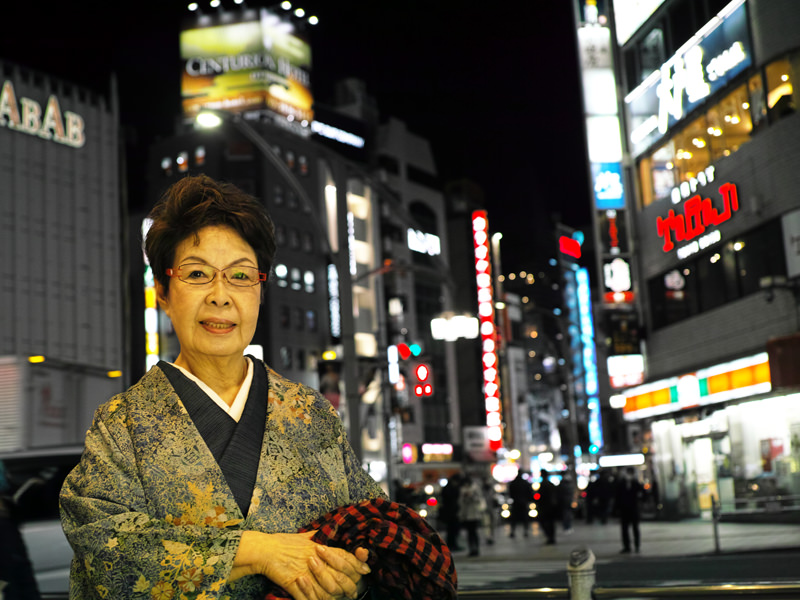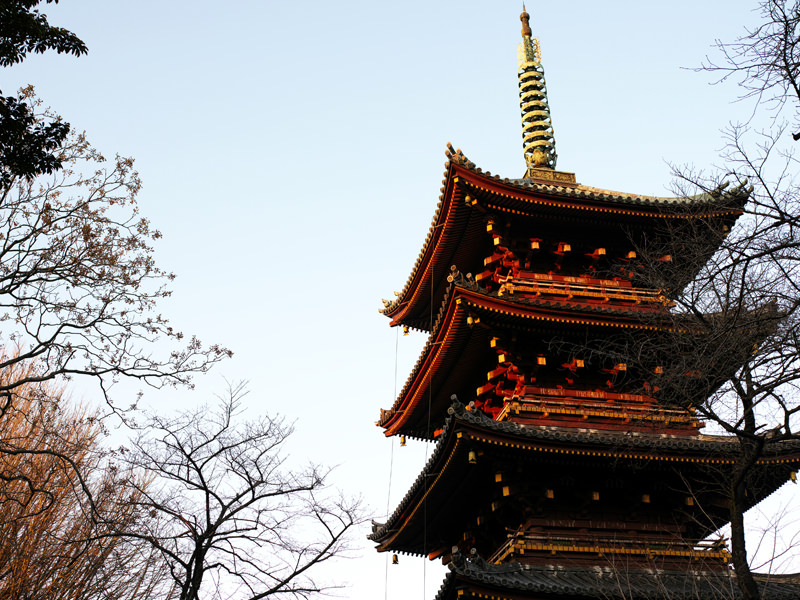Ueno Natives | 上野っ子
森重ひろみ
Hiromi Morishige


「おせっかいなのよ、私」言いながら森重ひろみさんは朗らかに笑う。
「片付ける努力が足りなくて自分の生まれた町が汚れていくのは許せなかったの」
かつて森重さんは10年を費やし、カラスによって食い散らかされる上野商店街のゴミ問題を解決した。
カラスたちは毎朝4時に街にやってきて収集前のゴミ袋の中の生ごみを引っ張り出しては道いっぱいに散らかしていった。
カラスを追い払うのではなくカラスが来る原因そのものを取り除く、それが彼女の出した方針だった。
森重さんは通りにある飲食店一軒一軒に掛け合って、ゴミの収集を朝4時前に終えることを徹底した。
たくさんの店がある中、簡単な道のりではなかったが、彼女は決して諦めなかった。
「自分が生まれた町だからね」
上野くらい幸せな街はないかも、と彼女は言う。
春は桜が上野公園いっぱいに咲き誇り、夏は蓮の花が不忍池を埋め尽くす。
秋は芸術文化のイベントで上野の博物館や美術館が街を盛り上げ、冬の夕暮れ時の弁天堂や五重の塔は格別に美しい。
そして彼女が生れ育った商店街は年中観光客で溢れかえっている。
上野が持つその独特のざわめきが森重さんをホッとさせる。
「東京の田舎っぺなのよ、私」彼女は時々そう口にする。
「上野しか知らないの。東京は洒落た街が多いけど、どこもすぐ飽きちゃう。上野みたいな下町はダサいって思われてるけどそのダサさがいいんじゃない」と笑う。
商売が上手くいって会社が大きくなると上野から銀座など他の場所へ店を移すところもあるが、ひろみさんは気取らず見栄を張る必要がない上野の土地柄が大好きだ。
「その分、上野には競争意識が無さすぎるかもね。だから発展性もないわよ」そう言って楽しそうに笑う。
森重さんは35年間、上野法人会の初代女性部の会長として公私に渡り地元の発展に尽くしてきた。
仕事の関係では知り会えない人達に会えたことが財産だと言うが、時には困難に心が折れそうなときもあった。
「本当にショックで力が出ない時は、夕日を見て心を落ち着かせるの」
彼女がひときわ力を込めて語った言葉が「人間なんて一番大切なのは人よ、友達よ」である。
一人で暮らす老人が増えてきたことを心配したひろみさんは、彼らの楽しみとなるよう老人向けのディズニーランドツアーを企画した。
主役はお年寄りたち。
この企画は20年続き、一回の参加者が1,000人を数えることもあった。
「お金にならないことが面白いのよ」彼女の言葉は確信に満ちている。
「お金は大事に動かしてあげるもの。でもお金で動かされちゃダメ」
「してやっている」のではなく「させてもらっている」という一心で今日までやってきた。
「下町の人達は心底優しい」そう感慨深げに彼女は言う。
「金離れがいいことと、他人のために涙を流せることが下町人間の良さね」
ただ、ひろみさんによると上野の人間は意地っ張りでわがままな一面も持っているらしい。
「みんないつだって自分の思いを通すの。やなことは絶対やらない。だから人生に悔い無しよ」そう言って彼女は微笑む。
上野の多文化共生についてはこう語った。
「上野にはよそ者を追い出す精神が無いの。外国人でも上野にいるなら法被を作ってあげてお祭りに呼ぶのよ。それまで日本に馴染めずずっと寂しい思いをしてた人が泣いて喜んでくれたこともあったわね」
彼女のようなリーダーがいる限り、これからも上野は多様性と活気に満ちた街であり続けるだろう。
(冊子では「地域の婦人部の会長」となっていますが、正確には「上野法人会女性部の初代会長」ですのでウェブ版にて訂正させていただきました。)
“I’m super obliging, you know,” so saying Hiromi Morishige laughs cheerfully.
“I couldn’t allow myself to let my hometown get messy just because of a lack of my effort.”
Once she has spent 10 years to solve a problem of crows’ tearing up kitchen waste all over the Ueno shopping district.
Every morning at 4 o’clock crows came to the town, and tore uncollected trash bags open then messed up the streets with the rubbish.
Her policy was not to fight off the crows, but to remove the cause of why the crows came.
Hiromi negotiated with every single restaurant in the district, and had everyone fully understanding to finish collecting all the trash bags by 4 o’clock in the morning before the crows came.
Since there were many restaurants there it wasn’t easy to do it at all, but she carried through.
“This is my hometown.”
Hiromi says that there is no better place than Ueno.
Cherry blossoms bloom fully all over Ueno Park in springtime, lotus flowers fill Shinobazu Pond during summer.
All the museums with various art and culture activities liven up the town in autumn, temples and shrines in Ueno look very beautiful in the evening sun in wintertime.
And the Ueno shopping district where she grew up is always packed with tourists.
The particular noise of a crowd in Ueno makes her feel home.
“I’m a countryside person from the central Tokyo,” she says sometimes.
“Ueno is the only place I know well in Tokyo. There are many other beautiful places in Tokyo, but I get bored of them easily. Some people say that an old town like Ueno is uncool, but to me, that uncool style is cool,” Hiromi is laughing and saying.
Some shops left Ueno and moved to other shopping districts that were regarded more stylish and sophisticated than Ueno.
Hiromi understands it, but she loves the free and easy atmosphere of Ueno more than anything.
“Ueno natives are too less competitive, and for that there is no much development in their business,” she laughs joyfully.
As the first president of the women’s division of the corporate association in Ueno, she has been doing her best for the community in her private and public capacities for 35 years.
Meeting new people through her community activities became her treasure, but not all the experiences were pleasant.
Some time people let her down badly by taking advantage of her kindness.
“When I get totally depressed, I watch the setting sun and let myself calm down.”
She says with an emphasis that the most important thing for life is to have good friends.
Because she was worried that the number of elderly people living alone got higher and higher, she planed a Disneyland tour for them and their grandchildren.
This tour has been carried out for 20 years, sometimes it went with more than 1,000 participants.
“Unprofitable work is most interesting,” she says confidently.
“We are responsible for using money, and not letting money use us.”
Hiromi’s motto is “Be privileged to serve others.”
She says that people living in an old town like Ueno are truly kind-hearted.
“Being open-handed and easily moved with deep sympathy, these are characteristics of the Ueno locals,” she tells.
On the other hand, Hiromi explains that all the people of Ueno never do whatever they don’t want to, and they never compromise.
“We live a life with no regrets,” she smiles happily.
Finally, she speaks about the situation of multicultural coexistence.
“This town doesn’t exclude people who want to join us. We invite foreigners living in Ueno to our local festivals with making their costumes. I saw one who had not been able to adapt and had been lonely cried with joy.”
As long as Ueno has a leader like Hiromi, it will remain diverse and lively.
(In the abridged version, Hiromi Morishige is wrongly mentioned as the president of the women’s association of the district. The correct one is; the first president of the women’s division of the corporate association in Ueno.)
